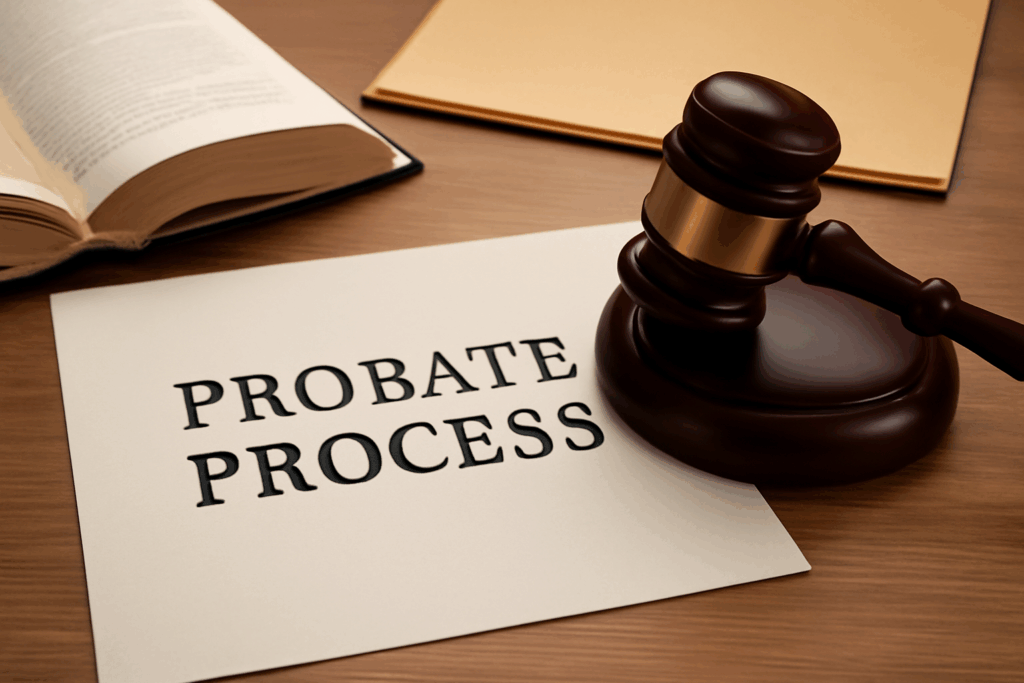Introduction
When someone searches for “What is the probate process in Connecticut?”, they are likely experiencing a stressful and emotionally charged situation. They may be dealing with the loss of a loved one, or perhaps they’re already in the midst of handling a relative’s estate and are overwhelmed by the legal and procedural complexities of probate. Probate is often associated with time-consuming court procedures, legal fees, and the uncertainty of how long it will take to settle the estate. Many are looking for clear, practical answers to help them navigate through the process smoothly, with the least amount of hassle, cost, and stress.
This person is likely trying to determine whether they can avoid a prolonged probate process or reduce the burden associated with it. They may be wondering if there’s a faster, easier option—like selling the house quickly for cash to a trusted investor—rather than going through the long and often expensive court process. At the end of the day, they need a solution that’s fast, simple, and requires the least amount of effort and cost. This blog will address these pain points and provide all the necessary information in a way that highlights how selling the house for cash to a reputable investor could be an excellent alternative to the typical probate process.
What Is the Probate Process in Connecticut?

If you’ve recently inherited a property or are responsible for handling a loved one’s estate in Connecticut, you may be wondering: What exactly is the probate process, and how can it impact the sale of the inherited property? Probate is a court-supervised process used to validate a deceased person’s will, settle debts, and distribute their assets to heirs. In Connecticut, probate is an essential part of estate administration. However, for many homeowners, it can be a lengthy and complicated process. Understanding the probate process in Connecticut and how it affects real estate sales can help you make better decisions.
The Basics of the Probate Process in Connecticut
When someone passes away, the estate—if they have assets like a home—must go through probate in Connecticut. The probate court is responsible for overseeing the distribution of assets according to the deceased’s will (or state law if no will exists). If you’ve inherited a home through probate, it’s essential to understand the steps involved and what needs to be done before you can sell the house.
The probate process in Connecticut typically involves the following steps:
- Filing the Will and Petitioning the Court: The first step is to file the deceased person’s will (if available) and a petition to open probate in the appropriate court.
- Appointing an Executor or Administrator: The court will appoint an executor if there is a will or an administrator if there isn’t. This person is responsible for managing the estate and ensuring that debts are paid and assets are distributed.
- Notifying Creditors and Paying Debts: The executor or administrator must notify creditors of the death and settle any outstanding debts. This can include mortgage payments, property taxes, and other obligations.
- Distributing the Estate: After all debts and taxes are paid, the remaining assets (including the property) are distributed to the heirs or beneficiaries.
It’s important to note that the probate process can take months or even years to complete, depending on the complexity of the estate and whether there are disputes among heirs. This long timeframe is one of the reasons many people look for alternatives, such as selling the inherited house quickly and avoiding a lengthy court process.
For more information on whether you can sell a house during probate in Connecticut, check out our detailed guide on Can You Sell a House in Probate in Connecticut?.
How to Sell a Probate House in Connecticut
For many people inheriting a home through probate, the main concern is how to sell the property quickly and with as little hassle as possible. The good news is that you can sell a house in probate in Connecticut, but there are a few steps you must follow to ensure a smooth transaction.
Steps Involved in Selling a Probate House in Connecticut
The first thing to remember when selling a probate property is that you can’t just sell it immediately after inheriting it. The probate court must give permission before the sale can proceed. Here’s a general outline of the steps involved in selling a probate property in Connecticut:
- Court Approval: Before any sale, the executor or administrator of the estate must get approval from the probate court to sell the property. This is because the property is part of the deceased person’s estate, and the court needs to ensure that the sale is in the best interest of the heirs and creditors.
- Listing the Property: After receiving court approval, you can list the property for sale. If you’re using a realtor, they’ll help you with the sale process, including determining the market price and finding potential buyers. However, you may also consider skipping the traditional route and selling your probate house as-is to an investor for cash.
- Selling for Cash: Selling a probate house for cash can be an attractive option for those who want to avoid delays, costly repairs, and the traditional selling process. Home buying companies near you that specialize in probate purchases often offer quick, hassle-free transactions and can close in as little as 7-14 days. This option may be especially helpful if you need to sell quickly to settle debts or distribute the estate.
- Distributing Sale Proceeds: Once the house is sold and the transaction is complete, the proceeds are distributed according to the terms of the will or the laws of intestacy (if there is no will).
In Connecticut, the probate court generally requires a court confirmation of the sale if the property is sold for less than its appraised value, which can extend the timeline. This is one of the reasons why many people prefer to sell a probate house for cash—it can speed up the process significantly.
To learn more about the benefits of selling a probate house for cash in Connecticut, explore our full article on Benefits of Selling a Probate House for Cash in Connecticut.
Common Challenges When Selling a Probate Home in Connecticut
While the probate process can be complex, the sale of the probate property can present even more challenges. Here are some of the most common obstacles you might encounter when selling a probate home in Connecticut.
Time Delays
One of the biggest challenges in the probate process is the length of time it can take. The probate process in Connecticut can last anywhere from a few months to several years, depending on the complexity of the estate and whether there are any disputes among heirs or creditors. These delays can be particularly frustrating if you need to sell the home quickly to cover debts or other expenses.
Additionally, if you’re selling the property via traditional methods, the process could take even longer due to market conditions, buyer financing issues, or other factors.
Costs of Selling a Probate Property
Selling a probate property typically involves several costs, such as:
- Real estate agent commissions (usually 5-6% of the sale price)
- Closing costs (title insurance, escrow fees, etc.)
- Property repairs and staging if you go the traditional route
These costs can add up, reducing the net proceeds from the sale. If you’re trying to sell the house quickly or want to avoid the hassle of repairs, you may find it more beneficial to sell the house without a realtor to an investor.
If you’re wondering about the common challenges faced when selling a probate home in Connecticut, get a deeper understanding by reading our post on Common Challenges When Selling a Probate Home in Connecticut.
Benefits of Selling a Probate House for Cash in Connecticut
If you’re dealing with a probate property in Connecticut, selling it for cash might be your best option. There are several key advantages to this approach that can make the process quicker and easier.
Speed and Convenience
Selling a house for cash is typically much faster than the traditional selling process. Investors can often make offers in just a few days and close within a week or two, helping you avoid the lengthy probate process.
No Repairs or Renovations
Selling your house as-is to an investor means you won’t have to worry about making costly repairs. Investors are willing to buy properties in any condition, which can save you both time and money.
No Realtor Fees or Commissions
By choosing to sell directly to an investor, you eliminate the need for a realtor, which means you won’t have to pay their commission fees (typically 5-6% of the sale price).
To understand the key steps to sell a house in probate quickly, read our guide on Steps to Sell a House in Probate Fast in Connecticut.
How Long Does Probate Take in Connecticut?
For anyone dealing with probate, one of the most pressing questions is: How long does probate take in Connecticut? The answer depends on the complexity of the estate, but it can take anywhere from 6 months to over a year.
Delays in Probate
The time it takes to complete the probate process in Connecticut can vary significantly. Simple estates may be completed in six months, while more complex estates—especially those with real estate involved—could take much longer. Disputes among heirs, issues with creditors, and the need for court hearings can add significant delays.
If you need to sell the property quickly, the extended probate timeline may not be ideal. In this case, selling your house to an investor who can close quickly may be the best option.
For a deeper understanding of how long probate takes in Connecticut, be sure to visit our article on How Long Does Probate Take in Connecticut?.
Understanding the Role of the Executor in the Probate Process in Connecticut
When you inherit a property through probate, one of the first things you’ll encounter is the executor or administrator of the estate. The executor is responsible for overseeing the probate process and ensuring that the deceased person’s assets are distributed according to the will or Connecticut’s laws of intestacy if no will is available.
In Connecticut, the executor must file the will with the probate court and take charge of managing the estate. This involves not only distributing assets but also paying outstanding debts, filing tax returns, and managing the property until it’s sold or transferred. The executor is a critical figure in the probate process, especially when it comes to selling a property.
If you are the executor or if you’re working with someone who is, it’s essential to understand that you have a fiduciary duty to act in the best interest of the beneficiaries and creditors. Failing to do so could result in personal liability. Executors also have the power to sell real estate during probate, but they must receive approval from the court before proceeding with the sale.
If you’re looking for a simpler, quicker way to sell a probate property, consider working with a professional house buying company near you. They can help streamline the process and avoid delays associated with traditional sales.
The Impact of Inherited Property Taxes in Connecticut
Inheriting a property in Connecticut may involve more than just handling the probate process; it could also come with tax implications. Understanding how property taxes, estate taxes, and capital gains taxes work is crucial when managing an inherited home.
Inheritance Taxes in Connecticut
While Connecticut does not have a state inheritance tax, there are still federal estate taxes that may apply if the deceased’s estate exceeds the exemption threshold, which is $12.92 million (as of 2023). However, most estates do not reach this threshold, and estate taxes typically do not affect smaller estates. For more information on federal estate tax exemptions, check out the IRS Estate Tax page.
Property Taxes
Even if you inherit a home, you are still responsible for paying property taxes until the property is sold or transferred. This can add up, especially if the probate process is delayed.
Capital Gains Taxes
If you decide to sell the inherited home, capital gains taxes may apply to the profit made from the sale. However, the IRS provides a step-up in basis, which means that the property is valued at its fair market value on the date of the decedent’s death. This can reduce the capital gains taxes owed upon sale.
If you’re not interested in holding on to the property or dealing with taxes and maintenance costs, selling the house for cash to a trusted investor could help you avoid these issues and move forward with the estate settlement quickly.
For a detailed explanation of capital gains taxes on inherited property, check out this article from the IRS Capital Gains Tax on Inherited Property.
The Probate Sale Process and Court Involvement in Connecticut
In Connecticut, the probate sale of a house is more complicated than a typical home sale due to the involvement of the probate court. Here’s what you need to know about the court’s role in the sale of a probate property.
Court Approval for Sale
One of the main differences when selling a probate property is the need for court approval. The probate court must verify that the sale of the home is in line with the deceased’s will, is fair to the heirs, and does not violate any laws. If the property is being sold for less than the appraised value, court approval is required.
The Public Auction Option
Sometimes, properties in probate are sold at public auction to ensure the sale price is as close to the market value as possible. This option can lengthen the timeline as it requires marketing the property to the public, conducting the auction, and waiting for final court approval.
Court Confirmation of Sale
After the sale is agreed upon, the probate court must confirm the transaction. If the court determines the offer is too low, it can require the executor to seek higher offers or re-negotiate. This process often results in additional delays and complications.
If you want to avoid this complicated and lengthy process, selling your house to an investor can be an excellent alternative. Investors typically don’t require court approval and can close the deal quickly.
How Selling a Probate House for Cash Can Help You Avoid Complexities
While probate can be an important legal step for settling an estate, the process can be stressful, especially when it comes to selling the property. One way to avoid the complexities of traditional home selling during probate is by selling a probate house for cash to an investor. This option can significantly reduce the time and effort involved in selling an inherited property.
Streamlined Process
When you sell your probate property for cash, you can skip many of the traditional steps involved in a home sale, such as repairs, appraisals, and showings. Investors buy properties as-is, meaning you don’t have to worry about making costly repairs or waiting for buyers to secure financing.
For additional insights into selling a home as-is and the benefits of cash sales, visit Bankrate’s Guide to Selling a Home As-Is.
Quick Closing
Selling a house for cash typically means a much quicker closing process compared to a traditional sale. In Connecticut, probate can drag on for months or even years, but investors can often close within 7-14 days, helping you settle the estate much faster.
Fewer Fees and Costs
When you sell to an investor, you don’t need to pay real estate agent commissions (usually 5-6%) or worry about closing costs, which can add up when selling a home traditionally. This means you get to keep more of the sale price, which can be a big relief when managing probate expenses.
If you want to learn how to avoid probate scams in Connecticut, check out our detailed blog on How to Avoid Probate Scams in Connecticut.
Conclusion
Selling a probate property in Connecticut can be a daunting and complex process. Between navigating lengthy court procedures, managing estate issues, and dealing with potential delays, it’s easy to feel overwhelmed. If you’re looking for a way to bypass these challenges, Green Apple House Buyers offers a streamlined solution to sell your probate house quickly and with minimal stress.
By choosing Green Apple House Buyers, you can avoid the traditional route of listing the property and waiting months to close. We specialize in buying houses for cash, which means we can close the sale in as little as 7-14 days—helping you move on from the probate process faster. Plus, you can sell your house as-is, without worrying about costly repairs or dealing with real estate agents and commissions.
If you’re dealing with a probate property in Connecticut and need a quick, hassle-free sale, contact us today. We’ll make you a fair, no-obligation cash offer, and guide you through the process every step of the way. Don’t let the complexities of probate slow you down—let Green Apple House Buyers help you sell your house fast and move forward with confidence.

